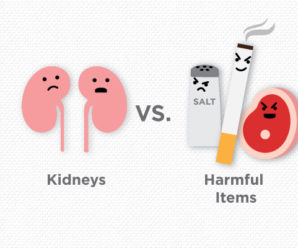Often times, when you have a cold or influenza, symptoms occur for a few days, maybe a week, but you return to your daily activities shortly after. However, COVID-19 symptoms have been different.

Dr. Shereif Rezkalla, Marshfield Clinic Health System cardiologist, studied patients’ symptoms after infection and published his work in the journal, “Cardiology Research.” Through his findings, a significant number of people continued to have COVID-19 symptoms that persisted for months after hospital discharge.
“Some patients may have prolonged symptoms and some do not,” said Dr. Rezkalla. “It is more common if the disease is severe.”
Long hauler syndrome studies
While many people infected with COVID-19 had asymptomatic or mild infection, those who had severe illness continued to have lingering symptoms. Although, Dr. Rezkalla found even patients with initially mild symptoms, like loss of taste and smell, can still have “long hauler syndrome,” in which symptoms persist beyond four weeks.
Post-acute sequelae of SARS-COVID-2 (PASC) syndrome is the clinical term for long hauler syndrome. Follow-up of COVID-19 patients in multiple countries have shown similar findings, PASC syndrome lasted for many months after resolution of the infection in up to 70% of the studied cohort.
In general, those patients who had more severe acute disease were more likely to experience PASC syndrome and were more likely to have continued worse symptoms. Up to 30% of COVID-19 patients may experience PASC syndrome.
Common linger symptoms
Persistent symptoms spanned many organ systems and were prominent in the pulmonary and cardiovascular systems. The most common complaints or lingering symptoms include:
- Cognitive dysfunction
- Cough
- Diabetes mellitus
- Diarrhea
- Elevated liver enzymes
- Fatigue
- Fogginess
- Headache
- Kidney dysfunction
- Loss of smell
- Loss of taste
- Low O2 saturation
- Nausea
- Palpitations
- Shortness of breath
In examination of deceased COVID-19 patients, extensive lung fibrosis and inflammation, abnormalities in the liver and myocarditis was present and showed damage done after infection.
“It is not surprising that many patients continue to have symptoms of shortness of breath, fatigue, cough and other symptoms long after the active infection has resolved,” Dr. Rezkalla said.
Treating lasting symptoms
Dr. Rezkalla found there is no clear single mechanism that may be responsible for PASC syndrome. The one clear finding is that many of the effects of the active COVID-19 virus linger after recovery.
“A patient with preexisting COPD may have significant added lung fibrosis with worsening of symptoms and may be even oxygen dependent,” he said. “Another patient with development of myocarditis during the acute phase may develop congestive heart failure and a variety of atrial and ventricular arrhythmias.”
Each individual and infection will be different, which is why it’s important to talk to your provider if you have COVID-19 symptoms that occur weeks after recovery to be properly diagnosed and treated.
Although there is no way to prevent lasting symptoms of COVID-19, Dr. Rezkalla said he recommends that a “good active life is always good advice.”







Leave a Reply